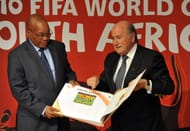5) Expected earnings from tourism from mega events are largely a chimera. Of the 450,000 foreign fans expected for the 2010 World Cup in South Africa, only 209,000 turned up, according to South Africa’s Tourism Minister Marthinius van Schalkwyk and the $900 million boost the ‘rainbow nation’ expected from tourism failed to materialize, reported The Telegraph.
A 2010 report of the European Tour Operators Association described the 2008 Beijing Olympics as “a toxic event that crushed normal demand, both business and leisure”.
The number of foreign tourists who visited the UK last August during the Olympics was about 150,000 less than those who came in the same month the previous year.
6) The infrastructure built for mega events often becomes a ‘white elephant’ or a millstone around the state’s neck, requiring huge expenditure on maintenance. One remembers how the infrastructure built for the National Games in Pune in 1994 went to seed and new infrastructure again came up at the same venue (Balewadi) to host the Youth Commonwealth Games in 2008.
The Athens Olympic Park is now a “ghost town” while the 91,000-seater Beijing’s Bird’s Nest has become a fairly popular tourist destination but can’t be put to regular use. Johannesburg’s $2.5 billion elite fast-train built for the World Cup has reportedly not broken even and still needs an $80 million annual subsidy to keep it chugging because the planners overestimated ridership by two-thirds. Durban’s new $1 billion King Shaka Airport remains a mostly desolate “aerotropolis” fantasyland, as none of the anticipated international hub traffic materialized.
7) There is only one winner in the economics of the World Cup, by several accounts, and that is FIFA. According to one account, the Zurich-based organization came into South Africa with $482 million as assistance for the event but walked out with a $1.9 billion profit, primary from its sponsorships, while the hosts ran up a bill of $4.5 billion. “So while South Africans are likely to be counting the costs of hosting a tournament that was supposed to help their economy, FIFA came away from Africa with their pockets full,” states Coates.
Patrick Bond, in a recent dispatch for Counter Punch magazine from Durban on the “Lessons for Brazil from South Africa, concurs:
“After egging us on to build hedonistic palaces, bullet-trains and airports while the vast majority here suffer so much, Blatter’s crimes against SA society and economy continue unpunished. His mafia took more than $3 billion in revenues back to Zurich without paying taxes or heeding exchange controls, and meanwhile the SA foreign debt soared from $70 billion just before the World Cup to $135 billion today…”
8) Brazilian icon Romario, the hero of its 1994 World Cup win, earlier supported the bid for the World Cup. But now the crusading and outspoken Congressman of the Brazilian Socialist Party (PSB), has become one of the staunchest critics. He blasted FIFA for announcing that it expects a profit of 1.67 billion euros from the 2014 event.
“I never thought the World Cup would solve all of our problems, but now my fear is that this mega event will only deepen the problems we already have,” he said. “FIFA comes to our country and imposes a state within a state. It’s not going to pay taxes, it’s going to come, install a circus without paying anything and take everything with it.”
Romario’s courageous stance (Rivaldo too has questioned the staging of the event while current players like Dante, David Luiz and Neymar have expressed solidarity with the protestors) is at variance with that of other local legends like Pele and Ronaldo.
The Brazilian situation perhaps has some lessons for us as well and should provoke more debate on our bid for the u-17 World Cup 2017.

